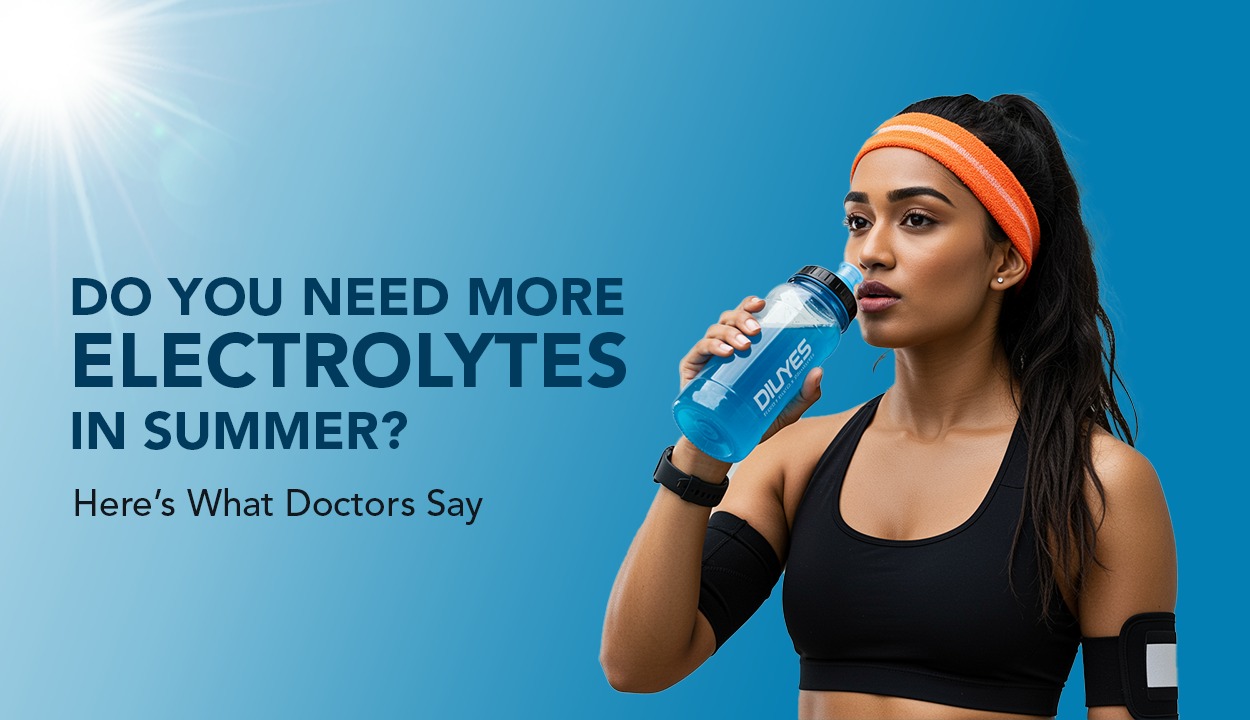
Do You Need More Electrolytes in Summer? Here’s What Doctors Say
Summer isn’t just about mangoes and sunshine—it’s also about sweating more, feeling drained faster, and battling the hidden toll the heat takes on your body. As temperatures soar, staying hydrated becomes more than a routine—it becomes a necessity. But beyond water, there’s another essential player your body quietly depends on: electrolytes.
This brings us to a real question: Do you need more electrolytes in summer, or is it just another seasonal myth? Let’s break it down.
The Link Between Electrolytes and Dehydration
Electrolytes are vital minerals—sodium, potassium, calcium, and magnesium—that help regulate hydration, nerve function, and muscle movement. Think of them as the fuel that keeps your internal engine running smoothly.
When you’re exposed to heat and sweat more than usual, your body doesn’t just lose water—it loses these essential minerals too. That’s where electrolytes and dehydration become tightly connected.
Do You Really Need Extra Electrolytes in Summer?
In most cases, yes—but not always.
If you’re a traffic policeman, delivery executive, athlete, or anyone spending long hours under the sun, you’re likely losing a lot of fluids and electrolytes. In such situations, replenishing electrolytes becomes essential to prevent heat exhaustion, muscle cramps, or even heatstroke.
However, if you’re spending most of your day indoors, staying moderately active, and hydrating regularly, your body usually maintains balance without the need for electrolyte supplements.
Signs You Might Be Low on Electrolytes
Your body usually gives clear signs when it needs help. If the following symptoms appear after sweating heavily, it’s a sign your electrolyte levels could be dipping dangerously low.
- Muscle cramps, especially in your legs or calves
- Fatigue or unusual weakness
- Dizziness or confusion after being outdoors
- Dry mouth, nausea, or chest discomfort
Natural Electrolyte Sources: Everyday Foods That Help
Fortunately, you don’t always need fancy energy drinks or powders. Simple foods you already enjoy can act as natural electrolyte boosters:
- Sodium: Table salt, ORS, salted buttermilk
- Potassium: Coconut water, bananas, oranges, watermelon
- Magnesium: Almonds, cashews, leafy greens
- Calcium: Milk, yogurt, tofu, ragi
Tip: A homemade glass of nimbu paani with a pinch of salt can often be as effective as expensive electrolyte supplements!
When Are Electrolyte Supplements Necessary?
Supplements like ORS solutions, Electral powder, or Enerzal energy drinks are useful if you’re:
- Recovering from illness
- Working out heavily
- Spending long periods outdoors in extreme heat
In these cases, a quick electrolyte top-up can prevent bigger health issues. Otherwise, sticking to a balanced diet and proper hydration is usually enough.
Smart Hydration: Balancing Water and Electrolytes
Water is essential for survival, but during hot summers, your body needs more than just fluids—it needs a balance of fluids and electrolytes. Here’s how you can hydrate smartly during the summer:
- Sip water regularly throughout the day, even if you don’t feel thirsty. Thirst is often a late sign of dehydration.
- Aim for at least 8–10 glasses of water daily, or more if you’re outdoors or physically active.
- Eat water-rich fruits like watermelon, oranges, and cucumbers, which also offer natural electrolyte boosts.
- Avoid sugary sodas, energy drinks, and excess caffeine, as they can worsen dehydration.
- Prefer cool water over icy-cold water to avoid thermal shock to your system.
- If exercising or working outdoors, hydrate 30 minutes before activity, sip water or electrolyte solutions during longer workouts, and replenish fluids afterwards to maintain your electrolyte balance.
So, Do You Need More Electrolytes in Summer?
The answer is simple: only if your lifestyle or situation demands it.
If you’re sweating profusely, are exposed to heat, or are recovering from illness, boosting your electrolyte intake is important, whether from natural electrolyte sources or from electrolyte supplements. But if you’re moderately active indoors, water and smart food choices are often enough.
However, if you experience persistent fatigue, cramping, or signs of dehydration despite consuming adequate electrolytes and water, seek immediate medical intervention. The specialists at Yashoda Super Speciality Hospital and Yashoda Medicity are here to help you with personalized hydration and electrolyte management plans.

